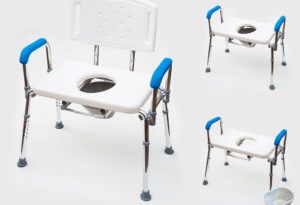Knee Joint Replacement: How Far Have We Come?
As humans age, the natural breakdown of their joints can be an issue. It is almost impossible to avoid it entirely, though you can always take supplements that should help you. You can also take yoga and similar classes that will hopefully keep you more flexible.
The knees are one area where you can start to feel your age as you enter your Golden Years. If you’re overweight, that also puts more stress on the knee joint. You may need to think about knee joint replacement sooner than someone who has stayed in optimal shape.
No matter when you require knee joint replacement, though, you will find that it is one of the more widespread orthopedic surgeon specialities. Orthopedists tend to specialize in the knee because of how common it is to have problems with it.
You may wonder if you’re looking at knee joint replacement how far medical science has come. Let’s take a look at that subject right now.
The Early Years
The good news is that science has come a long way since these procedures were in their infancy. There have been notable advances in implant design, and most doctors expect better patient outcomes on the whole if you must submit to this kind of surgery. The procedure is relatively simple.
In the old days, which is to say the 1960s, when this procedure was first attempted, the results were a little less dependable. Doctors who first tried to give patients artificial knee joints didn’t know how long the new joint would hold up.
The early implants definitely had some restrictions. Their durability wasn’t great, and neither was their design. The need for so-called revision surgeries saw a very high percentile within the first decade after an operation.
Better Materials
The reason why these surgeries have gotten better over the years can mostly be attributed to the use of more reliable materials to make the new knee joints that are safe for installation in a human body. Metal alloys started to be used, and also polyethylene.
The surgical techniques also got better. If you’re one of the first individuals to get a surgery that has never been done before, that can be a nerve-wracking experience.
As time passes, and as more doctors start to feel comfortable performing the operation, you should begin to see better results. That is the case with knee joint replacements.
An Implant Can Last You From 15-20 Years
If you have severe knee arthritis, that is one of the main reasons why you might need to have this procedure. You can get pain relief if you decide to go through with it, but you may also have a better range of motion and the ability to walk further. Running is probably not going to be possible for you any longer, or at least it is not something that most orthopedists would recommend.
An implant can last you 15 years or perhaps as long as 20 in optimal situations. After that, you may need to have a revision surgery. If you’re careful with how you get around in the years after the replacement, though, and you also don’t put on a great deal of weight, you can expect to get more time out of your new, artificial knee joint.
Key Points About the Latest Knee Joint Replacements
In the modern era, you can expect a fast surgery, quicker recovery time, and overall better results in almost all cases. The improved implant designs are one of the major reasons for all of this.
Today’s artificial knee joints are more flexible and articulated than the ones you would have gotten in the 1960s. The materials are better at mimicking the natural movements of the human knee.
They can be customized and meet the needs of individual patients better. An artificial knee isn’t just something that comes off an assembly line and that a doctor then sticks in your body. It can be custom-made so that it’s the best match for your body type.
Function and longevity are nearly always assured, assuming you found a doctor who knows what they’re doing. That’s why it’s important that you locate an orthopedic surgeon who has excellent feedback from former patients.
Improved Surgical Techniques
The improvement of surgical techniques is something else that you can point to if you want to understand why these procedures go better in this relatively young century. A doctor can now make a much smaller incision. The implant can also be installed with much more precision than was once the case.
There is less pain right after the operation and in the weeks and months after it. That being said, though, you can expect to go through a good deal of physical therapy as part of the recovery. That is not exactly fun, but it’s part of the process that you must submit to if you hope to regain much of your range of motion and ability to walk or even jog.
Robot-Assisted Surgery
There is one more factor that must be mentioned when it comes to what today’s knee joint replacement surgeries look like as compared to the ones of yesteryear. Now, doctors can use robots that can help them make these procedures still more precise.
The accuracy and precision of these robots is something to behold. What’s more, this technology is still considered to be in its infancy.
What seems likely is that at some point in the not-too-distant future, a robot will be able to perform the operation entirely with minimal or no assistance from an orthopedist. We’re not quite at that point yet, but it’s on the horizon.
If you hear that you need knee joint replacement, that’s probably not going to be cause for celebration, but it’s not something that has to be feared as much as in the old days. In all likelihood, assuming you pick the right surgeon, you should be back on your feet within a matter of months. You’ll also experience reduced pain and gain mobility.





I know a lot of people who have had a knee replacement. It is interesting to learn about how the modern knee replacements work.
i always love to read about these tech advancements the most – the ones that can help people lead better lives..
Wow, this post was eye-opening. I love that you mentioned Robot-assisted surgery. The most recent horror movie I watched featured this method, and I figured I would see more of it in the future.
It’s interesting to see how much has changed in medicine over time. Running is the only exercise I enjoy, so hopefully I won’t have to worry about knee pain.
It is amazing how the surgery along with the new technology can help with the knee replacements, at some point I might have to replace some.
I am trying to be extra careful. I agreed to run a 5k in April with my two grandsons. I am training daily to prepare. But being in the over 50 group I worry about all my joints.
I am glad the surgery has improved. I wouldn’t be surprised if I needed a replacement at some point.